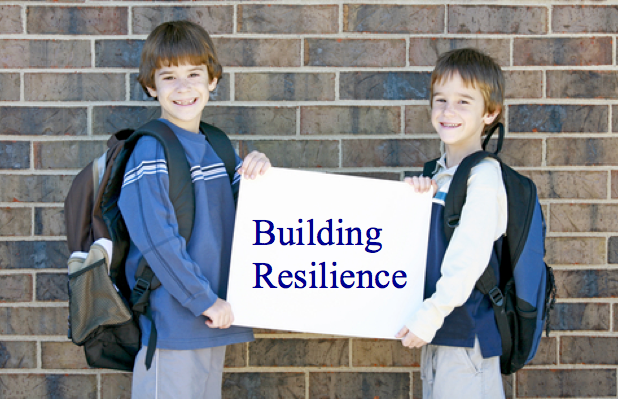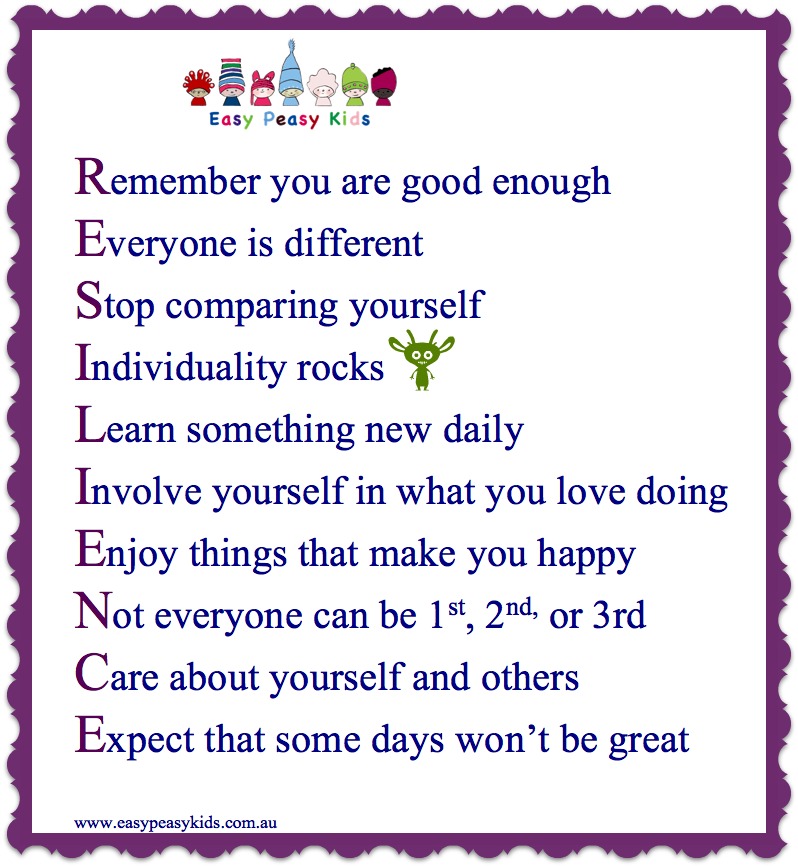Resilience the capacity to recover quickly from difficulties. Traumatic issues whether emotional or physical abuse take much longer to recover from, some stay with you for the rest of your life, you move on the best you can. Some days will be hellish and some days a little better.
This post is about increasing resilience in our children in everyday situations at home and at school. Resilience does not mean you cover up how you are feeling, you feel what you feel for a reason, it’s about not letting it eat you up for days on end and knocking the confidence out of you. It means you move on. It means you keep trying. It means you don’t give up.
Building Resilience at School
 Friendship dynamics in the playground can be tough and complicated for children to comprehend. Children surely should just all get along and play nicely, what have they got to be worried about? Yet I struggle understanding situations amongst friends now and that’s as an adult. Bullying is not acceptable in any shape or form whether it be actions or words but that’s an all together different topic, which I will be covering soon.
Friendship dynamics in the playground can be tough and complicated for children to comprehend. Children surely should just all get along and play nicely, what have they got to be worried about? Yet I struggle understanding situations amongst friends now and that’s as an adult. Bullying is not acceptable in any shape or form whether it be actions or words but that’s an all together different topic, which I will be covering soon.
Children can be best friends one day and not the next, normally most friendship situations in which “I’m not your friend anymore” resolves itself within a day. Children like adults can have off days and children like adults have the right to choose who their friends are. Granted that when a child says “I’m not your friend anymore” it is hurtful to the child involved. They will be sad but having them understand that it is not their fault is important in building up their resilience. Resilience involves being comfortable enough with who you are to understand that certain situations are out of your control.
As parents we love our children unconditionally. “I love you so much. I love everything about you. You are perfect ” When a child understands that you love them is the best feeling ever for them but they also need to know that not everyone will love them or even like them. The real world can be an onslaught on your self-worth if you have no resilience.
When I see children struggling with a particular task, their frustration rising and they want to give up. Stepping in together we break down the task into much smaller accomplishable targets. A spelling sheet of a 100 words can be daunting. We cut them up, make a treasure box and learn one word a day and fill up our treasure box. The treasure box is magic as when you pull out the words you can start to make sentences and create your own stories. Starting with smaller tasks builds resilience to move onto bigger activities.
In teaching I praise children heaps, imagine a high praising evangelical minister without the religious strings attached and that’s me; Mrs Brown, the child praiser. When I observe a child giving something a go, the end result becomes part of the bigger picture, if the child has put the effort in then that is the intricate part of them trying, hence the praise. With “Great effort, I saw how much you were trying and that’s brilliant,” the child feels quite happy within themselves and will more than likely give something a try again. Building up their I’ll have a go resilience.
Building Resilience at Home
There will always be winners and losers in real life and although losing does not make you feel good, it should not be soul destroying. Accepting how your child feels and validating their feelings may seem ludicrous at times, when they are upset over what we may feel is a small issue on the scale of things but this helps them understand that it is ok to feel sad, angry, upset etc… and allows them to accept how they feel and also move on. Listening and acknowledging them builds their resilience.
Board games are fantastic in developing resilience, you win some you lose some. Did they have fun playing? Then it does not matter if they lose. Yes they can feel upset that they lost but the participation is the key, not the end result. Before you say but my child does not like board games, it takes time to enjoy the participation part, make it fun, make it part of something you do once a week. Choose simple fun games like UNO, Pictionary even Hungry Hippos.
Help your child look at the bigger picture, use your own experiences. With children it is ok to say “Mum feels flat today I have so much on,” explain tomorrow is a new day you feel sad cannot pinpoint why and that is ok too. Real life has our emotions up and down, resilience helps us cope by accepting how we feel and moving on when we feel ready.
Reading to them and breaking down the story, even creating different scenarios “How would you feel if that had happened to you?”, helps them verbalise how they would feel in a similar situation, almost creating a resilience force field for when a similar situation happens in real life. They have a point of reference they can refer to.
Resilience is for life
Resilience is something we all need not in the “Toughen up princess” kind of way but in accepting that certain things will be what they are through no fault of our own.
I would love to hear any tips or techniques you use to build up resilience in your children or yourself.








We are working on this alot both at school and at home, especially for my anxious child. I blogged about the catastrophe scale we use a while back which we’ve found super helpful, that and helping my child develop their own ‘self talk’.. almost like giving her a script to use when she is feeling anxious or like she can’t go on…. it is a long slow road for us, but hopefully we are getting there!
Hey gorgeous are you happy to share the link to your post? Anxiety is really tough for children, it’s a constant pattern that keeps going. I also find having something small in their pocket that they can hold onto a squeeze helpful. I’ve been trying out making home made balls made of cloth with the child. We put their worries inside along some super strength. Spray with lavender. Then they can hold it as a comfort and even smell in some super strength.
Now this is an idea, Nathalie and Kate. THank you. I have a ‘recipe’ for knitted balls here that could well work. Time for us to try something new. We are going through an extended phase of this (resilience building) ever since school started last year.
Great timing. Thanks again, Nat.
There’s so much to adapt to when you start school, many kids feel this way. Sometimes even the ones that look they are doing great have their worries too. Lots of support and acknowledging that it’s ok they feel like this. Call me anytime lovely xx
Great, great post Nathalie, this really resonated with me, do you mind if I share it? x
Thanks. Of course you can share xx
This is a great post. We’re right into building resilience at school however I was just searching this topic for my Mr 4 – a few resilience issues there. Playing board games is a great strategy. Trying it.
Great to see schools building resilience, other ideas for your Mr 4 simple ball catching game, without dropping it i.e.: can you catch it 10 times, building towers with blocks
Thank you.
I shared this post through social media and thought I had left a comment but it has not appeared.
Thank you for this. My son has just started pre-school and already there have been circumstances that require resilience. I believe we have acted well so far but having new tips, tricks and techniques is very valuable.
Becc @ Take Charge Now
Gorgeous I’m sure there must be a place or a black hole in the internet universe where many comments go, sorry it’s disappeared. Thanks for sharing. If you have any questions just email me x
Hi, Nathalie!! I am printing this out for one of my students’ mother. He is so very sensitive to all around him. We need to build up his resilience ASAP. You’re awesome!!
Thanks lovely, hope it helps x
Hello gorgeous – thanks so much for sharing these tips, lack of resilience is one my biggest fears as my boys go from toddlers to little boys, as it can be so destructive in the long term if you don’t have it. Inspired to never give up.
Nic x
Your boys have you and you are perfectly feisty in the best way possible. Xxx
This is so helpful. I’ve never though of a board game as a way to teach resilience! As my children grow and mature, budilging resilience is weighing heavily on me as a parent. I hope that I’m some sort of living case study as I roll with my own punches…so to speak.
Having two children with speical needs, learning resilience has been espeically important…because I find…so much more has to be taught…with strategy…that is, they don’t tend to pick up on non-verbal stuff as they go along…and that ability for insight. And this is where I struggle more as a parent. This post made me look back at a post I wrote ALMOST THREE YEARS AGO — can’t beleive it’s been that long — (http://beafunmum.com/2010/06/the-anxious-child-red-brain-green-brain/)…and I can say that now, my daughter (now almost 12) is INCREDIBLE at dealing with stress and anxiety now. It’s been a long, slow but steady process and I’m just so very, very proud of her.
Kelly that’s so wonderful to hear, it’s so important that we build up their resilience in the early years. Will pop over and read your post shortly xxx
Such a helpful post Nathalie…I had a lot of issues with this as my teen has grown up as she is a very sensitive child who has always had difficulty ‘connecting’ with other children and emotional situations. One of my twins seems to be the same so I am going to be working on resilience again…thanks so much for sharing this article x
Thanks if you have any questions just drop me an email x
Fabulous post Natalie. We use board games a lot at home as well as a way of trying to build resilience. It’s so hard as a parent to hear and see your child be hurt and confused because of someone else’s words or actions but it is bound to happen and when it does, I always try and talk about it together and try to help her understand that whilst it doesn’t feel nice she has other options (such as, walking away, finding someone else to play etc) that can help her get on with her day. Sharing on sulia etc. Great poster at the end as well, by the way. 🙂 x
Thanks so much, glad you liked it and for sharing. I have no idea of what do to on Sulia as I’m a little time poor at the moment x
Such an informative post Nathalie! Miss Possum is very sensitive to people telling her they’re not going to be her friend, so I know we’ll have some issues the more she progresses through school. I’m going to try to build resilience where I can. Thanks for the tips.
Pleasure Penny, if you have any questions you can email me x
I worried so much about my son in primary school – he had few friends, was a target for bullies, and often sat alone at lunchtime. His self-esteem was so low that I was terrified he would become a teenage suicide statistic. We discovered he had a real talent for drawing, and encouraged him to pursue that. It gave him a sense of pride when people, other than family, applauded his work, and turned his attitude right around. He’s nearly 16 now, still only has a few close friends, but is so comfortable in his own skin that I could cry with relief.
Finding a child’s passion is so very important. Thank you for sharing your story x